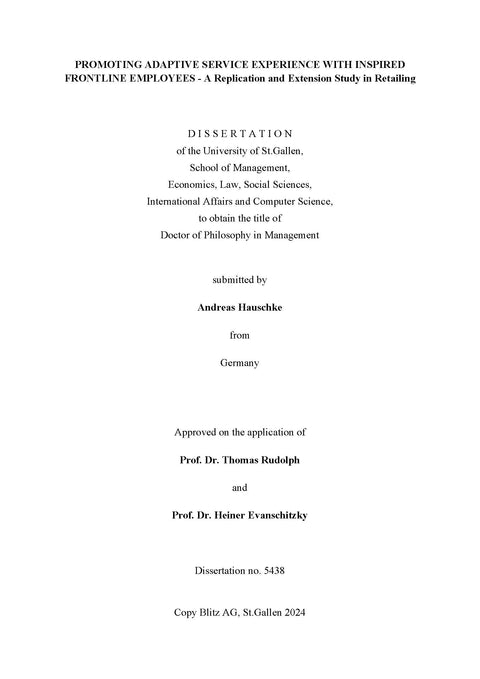
Promoting Adaptive Service Experience With Inspired Frontline Employees - A Replication and Extension Study in Retailing
Author: Andreas Hauschke
Language: English (nur als PDF-Datei erhältlich)
Delivering excellent service offerings is critical to physical retailers’ long-term success. In this context, frontline employees (FLEs) have become the key players in creating value for customers and represent a key opportunity, particularly for service-focused retailers, to strengthen the future of physical retail. Facing changing consumer behaviors due to the aftermath of COVID-19 and increasingly fierce competition from established offline and new online competitors, physical retailers struggle to stay competitive without cutting payroll expenses for FLEs. In response to this dilemma, scholars recognized the importance of FLEs customizing their services to customer needs to enhance service interactions at the physical point of sale (POS) in so-called adaptive service offerings. Understanding the factors that affect adaptive service offerings, specifically in retail, is important because physical retail is heavily disrupted by the progressive shift from product to customer experience. As a result, retailers must educate FLEs on why and how to adapt service offerings and provide the right work settings. Consequently, physical retailers need to reengage with their customers by positioning themselves as providers of inspiring shopping experiences to increase their share of wallets, cross-selling, and profitability. FLEs are one important source of such inspiring shopping experiences. This dissertation contributes to a better understanding of how retailers can promote FLE inspiration by extending Wilder et al.’s (2014) study and testing a more comprehensive framework of adaptive service offerings that considers psychological mechanisms, namely FLE inspiration. My findings can help physical retailers train their FLEs more effectively. Building on the qualitative data from 293 FLEs in the DACH region (Study 1), two online survey studies were conducted, in the UK (Study 2) with 248 FLEs, and with 525 FLEs from the German-speaking DACH area (Study 3) to test this new model. The findings showed that FLE inspiration significantly mediates the effect of retailers’ perceived service climate and FLEs’ structural empowerment on three FLE variables, namely empathy, anticipation, and creativity. These three FLE-level variables precede adaptive service offerings. Most importantly, the combined findings of the three studies provide strong support for FLE inspiration mediating the relationship between FLEs’ immediate work environment and their attitudinal and behavioral outcomes. These findings offer managers practical insights into how they can inspire their FLEs and improve service offering adaptation.
